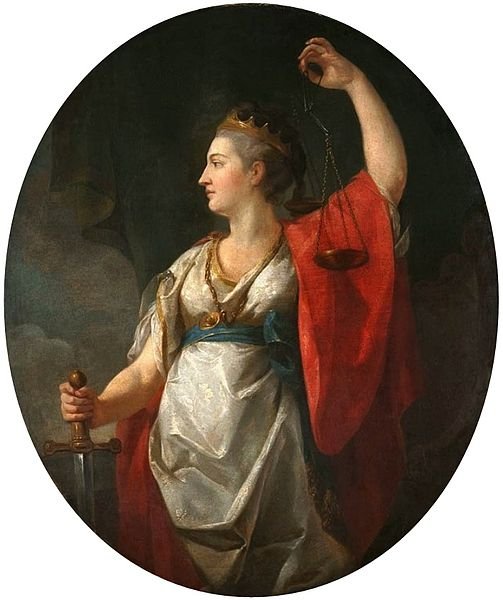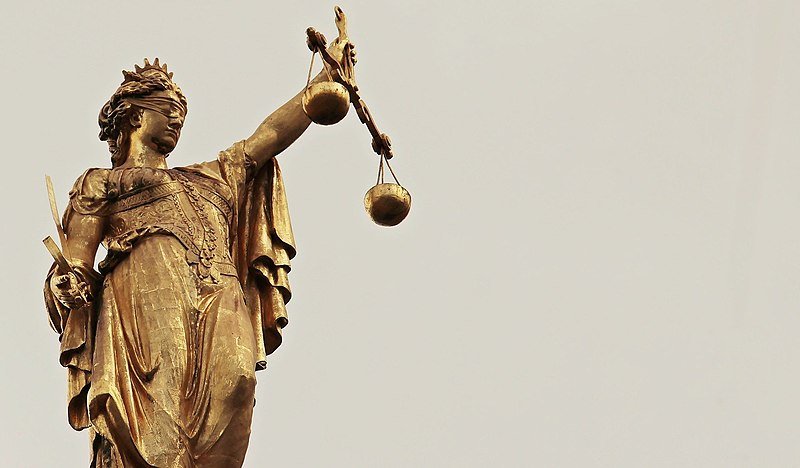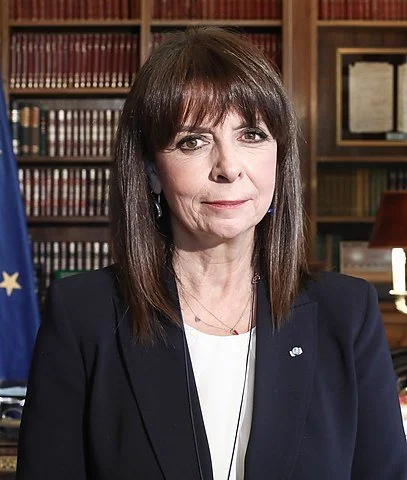Themis
impression of Katerina Sakellaropoulou
“Despite numerous female achievements in political and social life, gender stereotypes remain strong and pose serious challenges to a balanced development and the self-realization of young women. The wage gap between men and women and inequalities in decision-making still exist, not to mention gender-based violence, physical, mental and sexual abuse of women— a very serious issue which is not tackled with due determination.
The most discouraging element of this sad reality, however, is the demonstrated tolerance, if not acquiescence, of women themselves towards gender inequalities. It often seems as if women have come to accept the dominant notion of discrimination which is not limited to biological but also extends to intellectual and social characteristics.
Young women often subconsciously adopt prevailing stereotypes, sometimes going as far as to believe that gender inequalities are firmly set, and that women should passively adhere to them.
This is not the case.
Stories of inspired and dynamic women and their achievements, no matter how marginalized or silent, reveal that if she has faith in her power, and demonstrates perseverance and devotion, any woman can become a great woman.
It may prove a bit harder for a woman to break the glass ceiling compared to an equally qualified man, but eventually she can succeed.”
Themis, School of Marcello Bacciarelli (1731–1818) PD-art-100, image: Wikipedia
Themis
Themis (source Wikipedia)
Themis
Θεμις
In Greek mythology, THEMIS was the Titan goddess of divine law and order, wisdom and good counsel: the personification of justice. In Greek, the word themis referrs to divine law and order.
Themis was also identified with Gaia especially in the role of the oracular voice of earth. A prophetic goddess and the interpreter of the gods’ will, Themis presided over the ancient oracles. She was the divine voice (themistes) who instructed mankind in the primal laws of justice and morality, the precepts of piety, the rules of hospitality, good governance, conduct of assembly, and pious offerings to the gods. Themis was believe to have issued important edicts to mankind through the great oracle of Delphi over which she reigned. She later passed on the Oracle to Apollo.
According to Hesiod’s Theogony, Themis was the daughter of Uranus (Heaven) and Gaea (Earth). She was Zeus’s second consort and his first counsellor: often represented seated beside his throne advising him on the precepts of divine law and the rules of fate. On Olympus, Themis maintained order and supervised the ceremonial. In the Homeric poems, Themis is the personification of the order of things established by law, custom, and equity. She is described as reigning in the assemblies of men (Od. ii. 68, &c.), and as convening, by the command of Zeus, the assembly of the gods. (Il. xx. 4.)
Themis was closely identified with Demeter Thesmophoros ("Bringer of Law"). Themis' six children, by Zeus, were the spring-time Horai (Horae, Seasons) and death-bringing Moirai (Moirae, Fates), the Hesperides. The Horae and Moirae reflect the dual-functions of Demeter's daughter Persephone.
She is often represented on coins resembling the figure of Athena with a cornucopia and a pair of scales. (Gellius, xiv. 46.)
Themis and King Aegeus, Athenian red-figure kylix C5th B.C., Antikensammlung Berlin
Portrait of the President of Greece Katerina Sakellaropoulou, photo: Theodore Manolopoulos
Katerina Sakellaropoulou
(Κατερίνα Σακελλαροπούλου) is the first female President of Greece.
Following a unanimous vote, she was elected by the Hellenic Parliament to succeed Prokopis Pavlopoulos on 22 January 2020, and has served as President of Greece since 13 March 2020.
A Greek judge, she has a progressive record on issues such as human rights, refugee rights, gay marriage, and environmental protections. Prior to her election as President of Greece, Sakellaropoulou served as President of the Council of State, the highest administrative court of Greece.
Katerina Sakellaropoulou was born in Thessaloniki, which also happens to have been the ancestral home of my great great grandfather, Moise Allatini, who was honoured by Jews and Muslims alike as “the angel of Salonica”.
Furthermore, Thessaloniki is named for the Macedonian princess and mermaid, Thessalonike, daughter of King Phillip II of Macedon and Nicesipolis, who, on the death of her mother, was brought up by Olympia, the mother of Alexander the Great. During the course of his life, Alexander amassed an empire stretching from Greece to Asia Minor, India and Egypt.
In his search to find the Fountain of Youth, Alexander brought back a flask of immortal water with which he washed Thessalonike’s hair. When Alexander died, Thessalonike was so grief-stricken that she threw herself into the sea, hoping to end her life.
Instead of drowning, she transformed into a mermaid, a sea creature with the head and upper body of a woman and the tail of a fish.
A Mermaid, John William Waterhouse, 1900; image Wikipedia
As a mermaid, when sailing ships passed by, Thessalonike, would ask the sailors the following question:
Is Alexander the king alive? (Ζει ο βασιλιάς Αλέξανδρος;).
The correct answer would be: He lives and reigns and conquers the world. (Ζει και βασιλεύει και τον κόσμο κυριεύει.)
Given this answer, Thessalonike would allow the ship and its crew to pass safely in calm seas.
Ulysses and the Sirens, Herbert James Draper, c1909, Ferens Art Gallery. Image via Wikipedia
Receiving any other answer would transform her into a fierce Gorgon-like creature, causing storms to wreck the ship, drowning the sailors on it, and sending them all to a dark and bottomless grave.
antefix with head of Gorgona. Fasos island (?), 4 c. BC. Pushkin museum, image via Wikipedia
References
- https://www.britannica.com/topic/Themis-Greek-goddess
- https://www.theoi.com/Titan/TitanisThemis.html
- New Larousse Encyclopedia of Mythology, Hamlyn Publishing Group Ltd., New York, 1959
- Ancient Mirrors of Womanhood, Merlin Stone, Beacon Press, Boston, 1984
- Dictionary of Greek and Roman Biography and Mythology
- When God Was A Woman, Merlin Stone, Harvest Edition, 1976
- The Civilization of the Goddess, The World of Old Europe, Marija Gimbutas, HarperCollins Publishers, 1991
- The Language of the Goddess, Marija Gimbutas, HarperRow publishers, San Francisco, 1989
- https://hubpages.com/education/The-Goddess-Themis-In-Greek-Mythology
- https://www.greekmythology.com/Titans/Themis/themis.html
- https://en.wikipedia.org/wiki/Katerina_Sakellaropoulou
- https://fr.wikipedia.org/wiki/Moïse_Allatini
- https://www.presidency.gr/en/president/
- https://www.fastcompany.com/90454456/katerina-sakellaropoulou-4-things-to-know-about-greeces-first-woman-president
- https://www.theguardian.com/world/2020/jan/16/greece-first-female-president-katerina-sakellaropoulou-kyriakos-mitsotakis
- https://www.womenalliance.org/katerina-sakellaropoulou-first-elect-female-president-of-the-hellenic-republic/
- https://en.wikipedia.org/wiki/Mermaid








